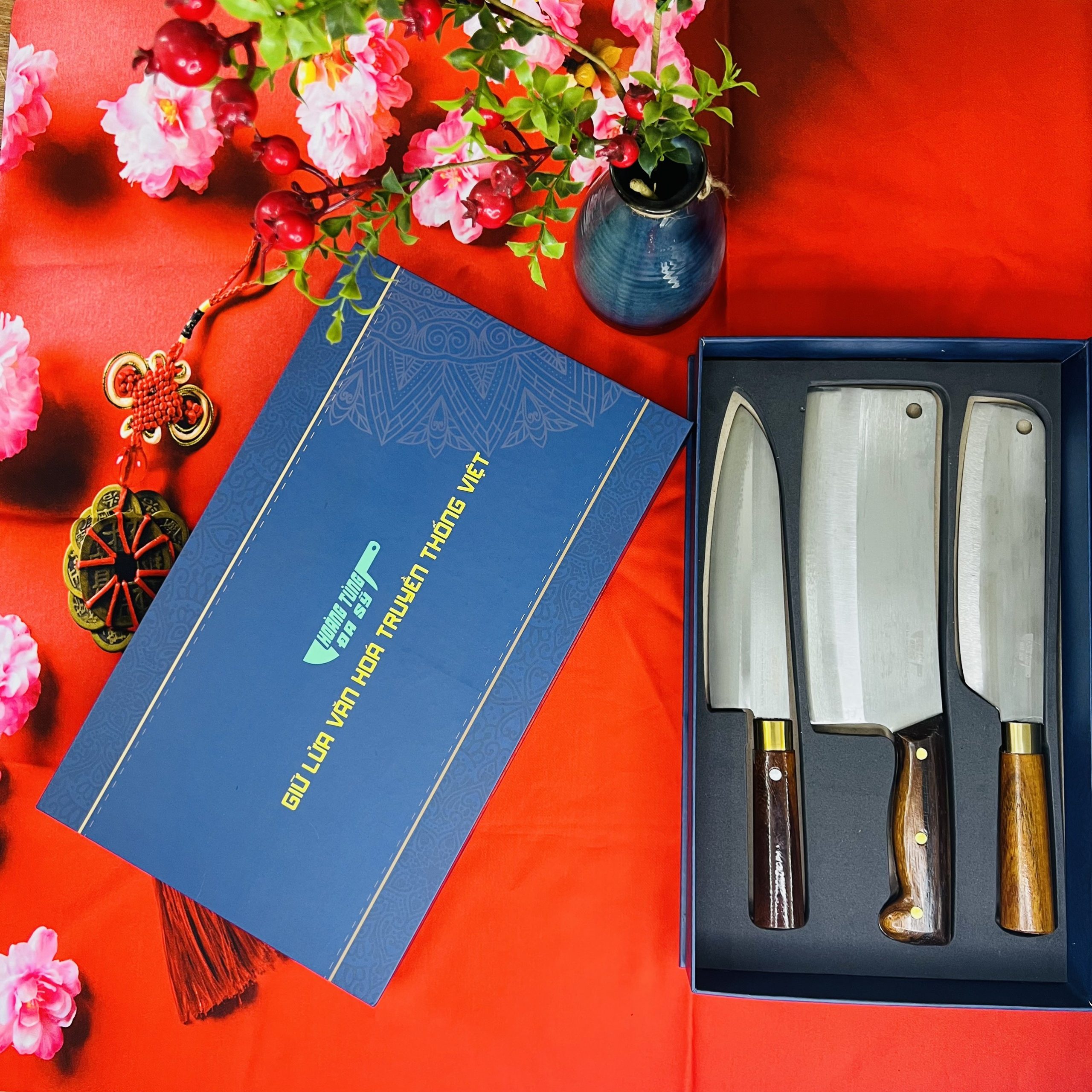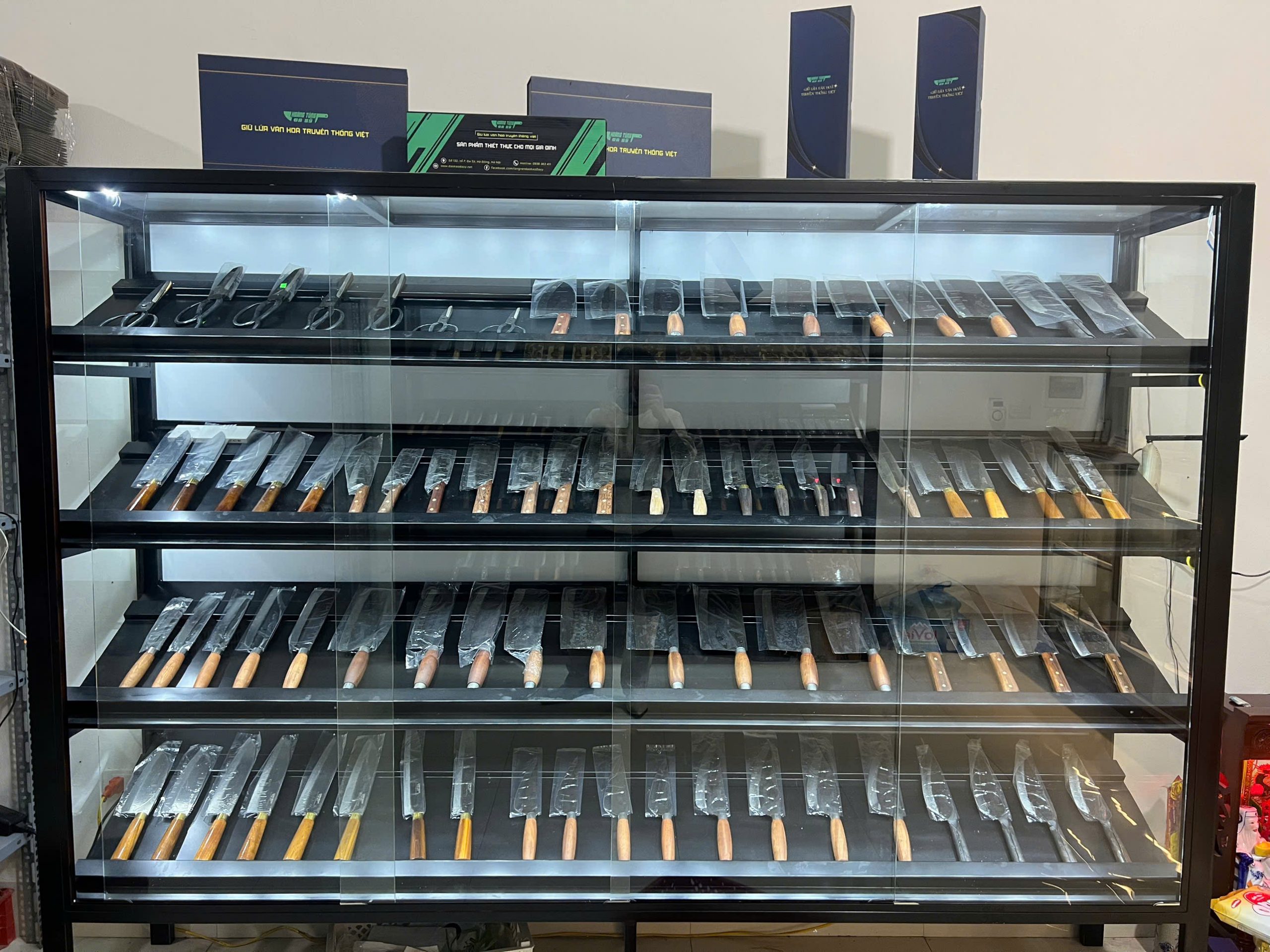No products in the cart.
Tin tức mới, Truyền thông
Discover the world of Vietnamese traditional craft knives
Introducing traditional craft knives
Traditional craft knives are knives that are made entirely by hand, from the talented hands of skilled artisans, with secrets passed down from generation to generation. The craft of making handmade knives has a long history of development in Vietnam, closely associated with the development of agricultural civilization and the need to use tools and implements in daily life.
Handmade knives are not only tools for labor and production but also objects closely associated with the cultural and spiritual life of Vietnamese people. In many families, handmade knives are considered family heirlooms, symbols of prosperity and well-being, and meaningful gifts to give to relatives and friends.
The outstanding feature of handmade knives compared to industrial knives is their uniqueness, sophistication, and quality. Each handmade knife has its own beauty, expressing the enthusiasm, skill, and experience of the artisan. Handmade knives are often made from precious materials such as steel, precious wood, horn… and undergo a meticulous and elaborate manufacturing process.
The process of making traditional craft knives
The process of making handmade knives is very complex, requiring the skill, meticulousness, and experience of the artisan. The main stages include:
- Material selection: The artisan will choose the appropriate materials for the intended use of the knife.
- Forging: This is the most important stage, the artisan will use a hammer to forge the steel billet into the shape of the knife.
- Grinding: After forging, the knife will be ground to remove excess details and create sharpness for the blade.
- Tempering: The knife will be tempered over fire to increase hardness and durability.
- Refining: The knife will be refined again to achieve the best flexibility and durability.
- Finishing: Finally, the knife will be fitted with a handle, polished, and decorated to complete the product.
Each stage has its own secrets, passed down from generation to generation. The differences in the production process of each craft village also create characteristics for the handmade knife products of each region.
Famous traditional craft knife villages
Vietnam has many famous traditional craft knife villages, each village has its own secrets and characteristics. Some typical villages include:
- Da Sy knife and scissor village (Hanoi): Famous for its sharp knives and scissors, from slicing knives and chopping knives to custom-made products from vehicle leaf springs, durable and beautiful, used in many fields and many products are exported abroad such as DAO HOÀNG TÙNG DA SY forging workshop.
- Phuc Sen forging knife village (Cao Bang): Famous for its types of knives, such as cleavers, hunting knives, jungle knives… made from special steel, with high durability.
- Cho Ren knife village (Hue): Famous for its types of knives, such as slicing knives, chopping knives, kitchen knives… with sophisticated and beautiful designs.
In addition, there are many other traditional craft knife villages such as La Guom knife village (Binh Dinh), Ban Gian knife village (Vinh Phuc)… Each village contributes to creating the diversity and richness of the world of Vietnamese handmade knives.
Cultural values of traditional craft knives
Handmade knives are not only tools but also works of art, bearing đậm nét traditional culture of each region. Handmade knives are symbols of the skill, sophistication, and dedication of the artisan. Each knife is the crystallization of good cultural values, niềm tự hào of Vietnamese people.
Handmade knives are also meaningful gifts, expressing the respect and affection of the giver. Handmade knives are often given on special occasions such as Lunar New Year, weddings, longevity celebrations…
Traditional craft knives in modern life
In modern life, handmade knives still play an important role. Handmade knives are not only used in families, in production but also collected and displayed by many people as a work of art.
The trend of using handmade knives is increasing, especially among chefs, those who love cooking and collecting knives. Handmade knives not only make cooking easier and more efficient but also bring inspiration and joy to work.
Traditional craft knife villages are a valuable cultural heritage that needs to be preserved and phát huy. There needs to be attention and support from the state, organizations, and the community for the craft of making handmade knives to develop sustainably. Every Vietnamese person should join hands to preserve and honor the good traditional values of the nation.

Exploring Da Sy village ‘s ancient art of knife-making
——————————————–
CONTACT US FOR FURTHER INFORMATION



